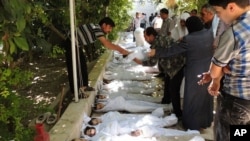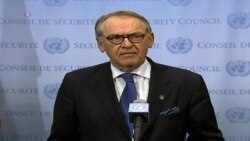UNITED NATIONS —
The U.N. Security Council is calling for a thorough, prompt, and impartial investigation into Wednesday's alleged poison gas attack by the Syrian military.
Syrian activists accuse government forces of using chemical weapons overnight in the suburbs of Damascus, killing hundreds of people.
Several countries called for an emergency meeting of the Security Council in response to the reports.
Following two hours of closed door discussions and a briefing from Deputy U.N. Chief Jan Eliasson, the council president, Ambassador Maria Cristina Perceval of Argentina, read a statement to reporters.
“There is strong concern among council members about the allegations and a general sense that there must be clarity on what happened and that the situation has to be followed carefully. All council members agreed that any use of chemical weapons by any side, under any circumstances, is a violation of international law," said Perceval.
She said the council welcomed Secretary-General Ban Ki-moon's call for a “thorough, impartial and prompt investigation” and underlined the need for immediate humanitarian assistance to the victims.
Video report by Zlatica Hoke
Wednesday’s alleged attack comes as a team of U.N. scientific experts is in the country to examine allegations of three earlier possible uses of chemical weapons by the government or the rebels.
The team has received government permission to visit three sites - one in Aleppo province at Khan al-Assal where Syria's government accuses rebels of using chemical agents in March - and two other sites that have not been identified, but likely are from a list of alleged chemical attack sites given to the U.N. by the United States, France and Britain.
The U.N. mission will try to establish only whether chemical weapons were used, not who used them.
Eliasson told reporters after he briefed council members that an investigation is needed immediately.
“This represents, no matter what the conclusions are, a serious escalation with grave humanitarian consequences and human consequences. We very much hope that we will be able to conduct the investigation. Dr. [Ake] Sellström and his team are in place in Damascus; we hope they will be given access to the area by the government," said Eliasson.
Eliasson expressed concern about the security situation on the ground and said that it is a “very dramatic situation” and is not conducive to access right now. He said this is another reason an urgent end to hostilities is needed.
Western diplomats said some 35 U.N. member states have signed a letter to Ban asking him to urgently investigate the latest chemical allegations.
The United Nations said earlier that the head of the investigation team is in discussions with the Syrian government on all issues pertaining to the alleged use of chemical weapons, including this most recent reported incident.
Ban has said repeatedly that if chemical weapons have been used in Syria, it would constitute a war crime for which the perpetrators must be held accountable.
Syrian activists accuse government forces of using chemical weapons overnight in the suburbs of Damascus, killing hundreds of people.
Several countries called for an emergency meeting of the Security Council in response to the reports.
Following two hours of closed door discussions and a briefing from Deputy U.N. Chief Jan Eliasson, the council president, Ambassador Maria Cristina Perceval of Argentina, read a statement to reporters.
“There is strong concern among council members about the allegations and a general sense that there must be clarity on what happened and that the situation has to be followed carefully. All council members agreed that any use of chemical weapons by any side, under any circumstances, is a violation of international law," said Perceval.
She said the council welcomed Secretary-General Ban Ki-moon's call for a “thorough, impartial and prompt investigation” and underlined the need for immediate humanitarian assistance to the victims.
Video report by Zlatica Hoke
Wednesday’s alleged attack comes as a team of U.N. scientific experts is in the country to examine allegations of three earlier possible uses of chemical weapons by the government or the rebels.
The team has received government permission to visit three sites - one in Aleppo province at Khan al-Assal where Syria's government accuses rebels of using chemical agents in March - and two other sites that have not been identified, but likely are from a list of alleged chemical attack sites given to the U.N. by the United States, France and Britain.
The U.N. mission will try to establish only whether chemical weapons were used, not who used them.
Eliasson told reporters after he briefed council members that an investigation is needed immediately.
“This represents, no matter what the conclusions are, a serious escalation with grave humanitarian consequences and human consequences. We very much hope that we will be able to conduct the investigation. Dr. [Ake] Sellström and his team are in place in Damascus; we hope they will be given access to the area by the government," said Eliasson.
Eliasson expressed concern about the security situation on the ground and said that it is a “very dramatic situation” and is not conducive to access right now. He said this is another reason an urgent end to hostilities is needed.
Western diplomats said some 35 U.N. member states have signed a letter to Ban asking him to urgently investigate the latest chemical allegations.
The United Nations said earlier that the head of the investigation team is in discussions with the Syrian government on all issues pertaining to the alleged use of chemical weapons, including this most recent reported incident.
Ban has said repeatedly that if chemical weapons have been used in Syria, it would constitute a war crime for which the perpetrators must be held accountable.






